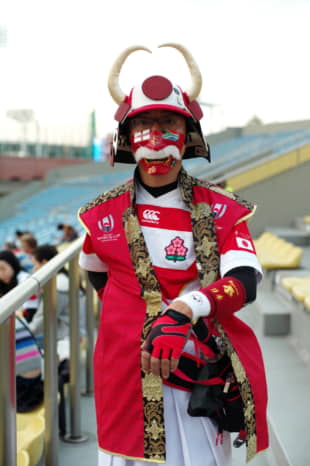Pride, sadness and hope were in the air at Prince Chichibu Memorial Rugby Stadium on Saturday, where thousands of mostly Japanese fans gathered for a public viewing of the final match of a historic Rugby World Cup final that ended with South Africa muscling its way to a decisive 32-12 win over England to take home the Webb Ellis Cup for the first time in 12 years.
The absence of Japan, following a loss to the Springboks in the quarterfinals, didn't seem to dampen the mood at Chichibu. Instead, many fans said they were proud of the way the Brave Blossoms performed, sad the World Cup was ending and excited to see what the future holds for rugby in Japan.

"I'm very sad it's ending," said Marie Bouilland, a 35-year-old Japanese fan who watched the final from Chichibu on Saturday night with her husband and two sons. "Rugby is an amazing sport and I'm glad Japanese people had the chance to see it up close."
Bouilland, who said her father played professional rugby in Japan, has been watching the game for years. She was in South Africa for the 1995 World Cup when the Brave Blossoms were thrashed by New Zealand 145-17. At this World Cup, over 20 years later, Japan made history by beating Ireland on its way to advancing to the quarterfinals for the first time ever.
"We've clearly come a long way," chuckled Bouilland. "I'm grateful I could watch the game like this in Tokyo with my family."
For the Naritas (who preferred their first names not be used), a married couple who live in Tokyo and joined the many who attended the public viewing at Chichibu on Saturday, it all began with the 2015 World Cup in England. It was in that tournament that the Brave Blossoms pulled off a miracle 34-32 victory over the Springboks, a result many refer to as the biggest upset in rugby history. Japan's iconic triumph in Brighton, England, that day sparked an interest in the sport among many Japanese that continues to this day.

"That game started it all for us," said the 50-year-old husband. "We didn't know we had a strong team. Now that we do, we know what that match meant to them. Now we know why they cried so many tears of joy."
"In rugby, you can only throw to the side or behind you. That means you must literally go backward to go forward," the 51-year-old wife said. "I really think its a beautiful sport."
The hallowed Japanese rugby ground hosting Saturday's public viewing was built in 1947 and has served as the stage for countless iconic matches. The stadium, however, was omitted as a possible candidate to host World Cup matches because it lacks the capacity required.

The stadium is slated for demolition prior to the 2020 Tokyo Olympic and Paralympic Games, during which the site will be used as a parking lot. The Tokyo Metropolitan Government announced in 2015 that the venue would be replaced by a new stadium in 2025. The new venue will be built nearby on the site where Jingu Stadium, which hosts college baseball and is also home of NPB's Tokyo Yakult Swallows, currently sits.
After Saturday's final, South Africa and New Zealand have now won the Rugby World Cup three times each, the most of any nation. The 10th World Cup will be hosted by France in 2023, which will coincide with the 200th anniversary of the "invention" of the sport by William Webb Ellis, who, according to the legend disputed by historians, created rugby during a soccer match by picking up the ball and running with it.





















With your current subscription plan you can comment on stories. However, before writing your first comment, please create a display name in the Profile section of your subscriber account page.